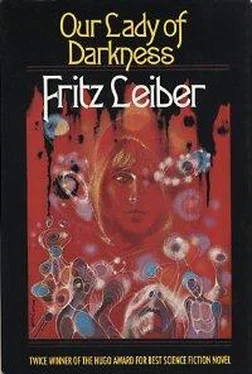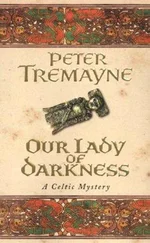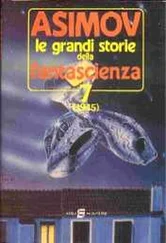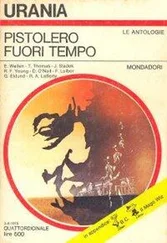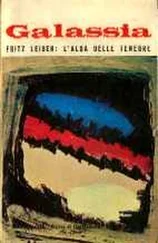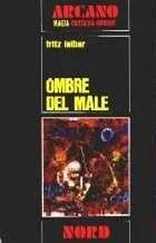With an effort he swallowed and continued eating, and recaptured his train of thought. Yes, now he had friends like Gun and Saul… and Cal… and his health was a damn sight better, and best of all, his work was going well, his precious stories (well, precious to him) and even that terrible Weird Underground stuff—.
Another scrutch , louder, and with it an odd little high-pitched laugh. He tensed himself and looked around quickly, sandwich and thoughts forgotten.
There came the laugh again, mounting toward a shrill shriek, and from behind the rocks there came dashing, along the path just below, two little girls in dark blue playclothes. The one caught the other and they spun around, squealing happily, in a whirl of sun-browned limbs and fair hair.
Franz had barely time to think what a refutation this was of Cal’s (and his own) worries about this area, and for the afterthought that still it didn’t seem right for parents to let such small, attractive girls (they couldn’t be more than seven or eight) ramble in such a lonely place, when there came loping from behind the rocks a shaggy Saint Bernard, whom the girls at once pulled into their whirling game. But after only a little more of that, they ran on along the path by which Franz had come up, their large protector close behind. They’d either not seen Franz at all or else, after the way of little girls, they’d pretended not to notice him. He smiled at how the incident had demonstrated his unsuspected residual nervousness. His sandwich no longer tasted dry.
He crumpled the wax paper into a ball and stuck it in his pocket. The sun was already westering and striking the distant tall walls confronting him. His trip and climb had taken longer than he’d realized, and he’d been sitting here longer too. What was that epitaph Dorothy Sayers had seen on an old tombstone and thought the acme of all grue? Oh, yes: “It is later than you think.” They’d made a popular song of that just before World War Two: “Enjoy yourself, enjoy yourself, it’s later than you think.” There was shivery irony for you. But he had lots of time.
He got busy with his binoculars again, studying the medieval greenish-brown cap of the Mark Hopkins Hotel housing the restaurant-bar Top of the Mark. Grace Cathedral atop Nob Hill was masked by the high rises there, but the modernistic cylinder of St. Mary’s Cathedral stood out plainly on newly named Cathedral Hill. An obviously pleasant task occurred to him: to spot his own seven-story apartment house. From his window he could see Corona Heights. Ergo, from Corona Heights he could see his window. It would be in a narrow slot between two high rises, he reminded himself, but the sun would be striking into that slot by now, giving good illumination.
To his chagrin, it proved extremely difficult. From here the lesser roofs were almost a trackless sea, literally, and such a foreshortened one that it was very hard to trace the line of streets—a checkerboard viewed from the edge. The job preoccupied him so that he became oblivious of his immediate surroundings. If the little girls had returned now and stared up at him, he probably wouldn’t have noticed them. Yet the silly little problem he’d set himself was so puzzling that more than once he almost gave it up.
Really, a city’s roofs were a whole dark alien world of their own, unsuspected by the myriad dwellers below, and with their own inhabitants, no doubt, their own ghosts and “paramental entities.”
But he rose to the challenge and with the help of a couple of familiar watertanks he knew to be on roofs close to his and of a sign BEDFORD HOTEL painted in big black letters high on the side wall of that nearby building, he at last identified his apartment house.
He was wholly engrossed in his task.
Yes, there was the slot, by God! and there was his own window, the second from the top, very tiny but distinct in the sunlight. Lucky he’d spotted it now—the shadow traveling across the wall would soon obscure it.
And then his hands were suddenly shaking so that he’d dropped his binoculars. Only his strap kept them from crashing on the rocks.
A pale brown shape had leaned out of his window and waved at him.
What was going through his head was a couple of lines from that bit of silly folk doggerel which begins:
Taffy was a Welshman, Taffy was a thief.
Taffy came to my house and stole a piece of beef.
But it was the ending that was repeating itself in his head:
I went to Taffy’s house, Taffy wasn’t home.
Taffy went to my house and stole a marrowbone.
Now for God’s sake don’t get so excited, he told himself, taking hold of the dangling binoculars and raising them again. And stop breathing so hard—you haven’t been running.
He was some time locating his building and the slot again—damn the dark sea of roofs!—but when he did, there was the shape again in his window. Pale brown, like old bones—now don’t get morbid! It could be the drapes, he told himself, half blown out of his window by the wind—he’d left it open. There were freakish winds among high buildings. His drapes were green, of course, but their lining was a nondescript hue like this. And the figure wasn’t waving to him now—its dancing was that of the binoculars—but rather regarding him thoughtfully as if saying, “You chose to visit my place, Mr. Westen, so I decided to make use of that opportunity to have a quiet look at yours.” Quit it! he told himself. The last thing we need now is a writer’s imagination.
He lowered his binoculars to give his heartbeat a chance to settle down and to work his cramped fingers. Suddenly anger filled him. In his fantasizing he’d lost sight of the plain fact that someone was mucking about in his room! But who? Dorotea Luque had a master key, of course, but she was never a bit sneaky, nor her grave brother Fernando, who did the janitor work and had hardly any English at all but played a remarkably strong game of chess. Franz had given his own duplicate key to Gun a week ago—a matter of a parcel to be delivered when he was out—and hadn’t got it back. Which meant that either Gun or Saul—or Cal, for that matter—might have it now. Cal had a big old faded bathrobe she sometimes mucked around in—.
But no, it was ridiculous to suspect any of them. But what about what he’d overheard from Saul on the stairs?—the ‘e-stealer’ Dorotea Luque had been worried about. That made more sense. Face up to it, he told himself: while he was gadding about out here, satisfying obscure aesthetic curiosities, some sneak-thief, probably on hard drugs, had somehow got into his apartment and was ripping him off.
He took up the binoculars again in a hard fury and found his apartment at once, but this time he was too late. While he’d been steadying his nerves and wildly speculating, the sun had moved on, the slot had filled with shadow, so that he could no longer make out his window, let alone any figure in it.
His anger faded. He realized it had been mostly reaction to his little shock at what he’d seen, or thought he’d seen… no, he’d seen something, but as to exactly what, who could be sure?
He stood up on his rocky seat, rather slowly, for his legs were a bit numb from sitting and his back was stiff, and he stepped carefully up into the wind again. He felt depressed—and no wonder, for streamers of fog were blowing in from the west, around the TV tower and half masking it; there were shadows everywhere. Corona Heights had lost its magic for him; he just wanted to get off it as soon as possible (and back to check his room), so after a quick look at his map, he headed straight down the far side, as the hikers had. Really, he couldn’t get home too soon.
Читать дальше
